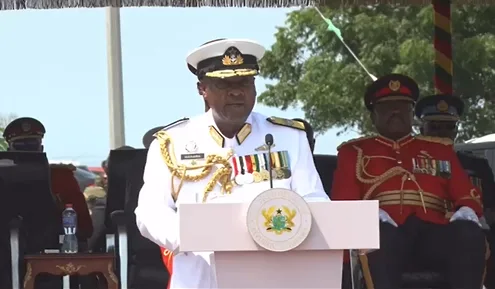Ghana Military Academy Upgraded to Post-Graduate Status: President Mahama Announces Major Educational Reform
Ghana’s Military Education System Receives Historic Upgrade to Strengthen National Security
In a landmark development for Ghana’s military education system, President John Dramani Mahama has announced a significant upgrade of the Ghana Military Academy’s Commissioning Course to Post-Graduate Diploma status. This transformative change, revealed during the Ghana Military Academy Graduation ceremony for Regular Career Course 63, represents a major step forward in the nation’s approach to military education and national security strategy development.
The upgrade comes alongside the establishment of a new National Defence University with a Presidential Charter, creating a comprehensive ecosystem for advanced military and security education in Ghana.
Presidential Charter Empowers New National Defence University
“I am particularly elated about the coming on stream of the National Defence University with the Presidential Charter,” President Mahama stated during his address to the graduating officers. “The Charter provides the Ghana Armed Forces with the mandate to explore and facilitate extensive teaching and learning towards more effective National Defence and Security.”
This Presidential Charter grants the new university significant autonomy and academic authority, positioning it to become a center of excellence for security studies in West Africa. According to the Africa Center for Strategic Studies, such specialized military educational institutions play a crucial role in developing strategic thinking capabilities within a nation’s security apparatus.
Ghana Military Academy to Become Constituent College with Enhanced Facilities
Under the new structure, the Ghana Military Academy will operate as one of the constituent colleges of the National Defence University. This reorganization comes with promises of improved facilities and resources to support the academy’s expanded educational mandate.
“Conceptually, as one of the constituent colleges of the National Defence University, the Ghana Military Academy will receive the needed facilities to achieve its mandate,” President Mahama explained.
Military education experts at the International Institute for Strategic Studies have consistently emphasized that modern military challenges require officers with advanced analytical capabilities and specialized knowledge – precisely the skills this educational upgrade aims to develop.
Post-Graduate Diplomas for Newly Commissioned Officers
One of the most significant aspects of this educational transformation is the elevation of the Commissioning Course to Post-Graduate Diploma status. This change means that newly commissioned officers will graduate with advanced qualifications that reflect their specialized military training.
“This intervention will actualize the upgrading of the Commissioning Course to be updated to Post-Graduate Diploma status for newly commissioned officers. And so when the officers are commissioned, they will come out with a Post-Graduate Diploma,” the President confirmed.
According to military education standards promoted by the United Nations Institute for Training and Research, this level of qualification aligns with international best practices for officer training programs worldwide.
Strategic Implications for Ghana’s National Security Framework
The establishment of the National Defence University and the upgrade of the Military Academy represent more than just educational reforms – they signal Ghana’s commitment to developing sophisticated security strategies through advanced military education.
The Stockholm International Peace Research Institute notes that countries with robust military education systems tend to demonstrate greater strategic foresight and operational effectiveness in addressing complex security challenges.
Building Regional Security Capacity Through Education
These developments position Ghana as a potential regional hub for military education excellence. With the Economic Community of West African States (ECOWAS) facing numerous security challenges, Ghana’s investment in advanced military education could yield benefits beyond its borders.
Military cooperation arrangements with regional partners could allow officers from neighboring countries to benefit from Ghana’s enhanced military education system, strengthening collective security frameworks across West Africa.
What This Means for Ghana’s Military Officers and National Defence
For Ghana’s military officers, these educational upgrades translate to enhanced career prospects, improved professional development pathways, and greater alignment with international standards for military education.
The transformation also reflects Ghana’s responsiveness to evolving security challenges, from cybersecurity threats to terrorism and maritime security concerns along the Gulf of Guinea, as documented by the African Union Peace and Security Council.
Long-term Vision for Military Educational Excellence
President Mahama’s announcement represents the culmination of long-term planning to elevate Ghana’s military education system. This vision recognizes that modern security challenges require military officers with advanced analytical capabilities, strategic thinking skills, and specialized knowledge.
By investing in military education at this level, Ghana is preparing its security forces not just for today’s challenges but for tomorrow’s increasingly complex security environment.
Advancing Ghana’s Security Through Educational Excellence
The upgrade of the Ghana Military Academy and the establishment of the National Defence University represent significant steps forward in Ghana’s approach to national security and defense education. These developments align with global trends toward higher education standards for military officers and the recognition that modern security challenges require advanced training and qualifications.
As these educational reforms take effect, Ghana’s military officers will be better prepared to address the complex security challenges facing the nation and the West African region as a whole.



